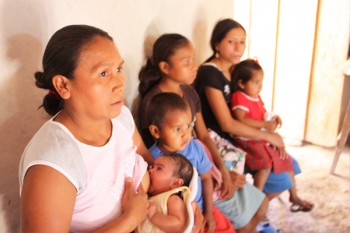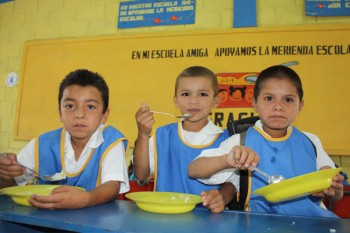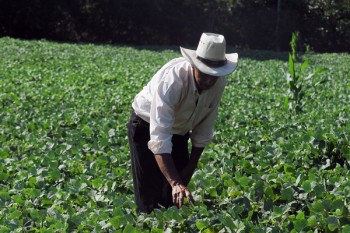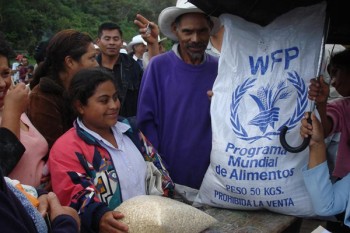
World Food Programme in Honduras -Vulnerable Groups
“One of the security measures we use is to have meetings with local authorities, so they know the project is being implemented and the mechanisms of selection of beneficiaries, thus avoiding speculation and conflicts between families in the community.” said Selvin Martinez.
Selvin Martinez works a volunteer -facilitator for the program and was part of a group of 14 people who have been trained in gender issues and protection in order to better implement the outreach programs they oversee. “To be a part of this training has completely changed my way of seeing things. I now examine each step thinking of the protection , impact and safety not only of the recipient but also my own. We have begun the transfer of this knowledge to participant mothers, mothers of program beneficiaries, but, especially husbands and fathers. Because of the machismo that exists in our communities, the men think that the responsibility to take their child to a health center is only of the mother. This is when childdren are exposed to many risks when [making nutritional choices] because they live in extreme poverty and far from health centres which are not only beneficial for the child but also the rest of the family. We are training men to become part of these processes and accompany their wives, or let them accompany the child to the health center while the mother is left to care for the rest of the family.”
The Vulnerable Groups Program is implemented in 8 departments, 91 municipalities and more than 300 health centres nationwide ; Selvin oversees 4 Communities in the department of Choluteca – Apacilagua , Concepcion de Maria , and Reitoca and Orocuina, serving 1,800 beneficiaries of which 450 are pregnant and breastfeeding women , 250 children aged 2-5 years, and 1,100 aged 6 to 23 months. Indirectly, the program is estimated to serve 105,000 people.
by World Food Programme (WFP) and any views expressed in this article are those of the author not HondurasNews.com
About WFP Vulnerable Groups Program in Honduras: The Programme to Assist Vulnerable Groups supports improved nutrition and health among children, pregnant and lactating women, mothers, people living with HIV/AIDS, and other vulnerable groups.
WFP aims to enhance the Government’s capacity to establish and manage food assistance and hunger-reduction programmes. The poorest and most food-insecure areas will be targeted in order to create conditions wherein these vulnerable groups can satisfy their special nutritional needs and their health needs related to nutrition.

World Food Programme in Honduras – School Meals
WFP provides assistance through activities that improve food security, health, and education for the most disadvantaged rural population. The Honduras programme’s primary objectives are to reduce food insecurity and malnutrition and to increase human development by improving the health, nutrition and education levels of children and other vulnerable groups. The WFP country programme is focused on the most food-insecure areas, mainly the western and southern regions of Honduras, identified by vulnerability analysis and mapping.
The WFP Honduras programme was developed in accordance with the United Nations Development Assistance Framework, the Government of Honduras´ Poverty Reduction Strategy and Millennium Development Goals 1, 2, 3, 4, and 6 and includes two main activities: school meals and support to malnourished vulnerable groups (mothers and children as well as HIV/AIDS affected and infected people). The School Meals Programme in Honduras supports increased access to education and reduced gender disparity in access to education. Daily meals serve as an incentive for families to send children to school and ensure that short-term hunger does not diminish children’s learning capacity.
Programme implementation targets the poorest schools, and includes education, health, water, and sanitation interventions. WFP works in partnership with the Government of Honduras, which provided funding through WFP to cover more than 1.2 million children in pre-school and primary schools. WFP and its partners, primarily Canada and the private sector, support an additional 150,000 children. Through this joint effort, almost 1.4 million children received a meal in more than 17,500 schools throughout the whole country, becoming the third largest WFP School Meal activity in the world.

World Food Programme in Honduras – Purchase for Progress
WFP Honduras recently launched a new activity: the Purchase for Progress (P4P) programme, which contributes to poverty reduction in Honduras by supporting the agricultural production of small-scale farmers, many of whom are women, and connecting them to the local market. In keeping with the agency’s policy to buy locally whenever possible, WFP purchases basic grains directly from small-scale farmers to distribute through school meals.
Farmers participating in P4P will gain access to agricultural supplies, credit, and technical assistance in the entire supply chain of corn and beans. They will also receive training in institutional strengthening and capacity building.
In addition, WFP Honduras is also responsible for saving and protecting lives through emergency support related activities. Through the Protracted Relief and Recovery Operation (PRRO), WFP supports poor and indigenous people living in isolated areas exposed to recurrent natural disasters, resolves the immediate crisis situation, and provides emergency food aid to save lives.

World Food Programme in Honduras – Protracted Relief and Recovery Operation (PRRO)
WFP in Honduras not only serves the immediate food needs of poor people who suffer from hunger, but also provides much needed support before and after emergencies, collaborating in a way that respects human dignity and promotes the self-sufficiency of individuals.
WFP has been present in Honduras since 1970. WFP has field and sub-offices in 17 departments that facilitate and monitor implementation and are responsible for enhancing partnerships with local governments and NGOs. 70% of WFP staff in Honduras is in the field and 52% of staff is female.
More about Honduras
You must be logged in to post a comment Login